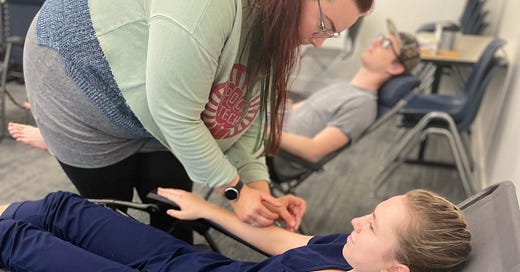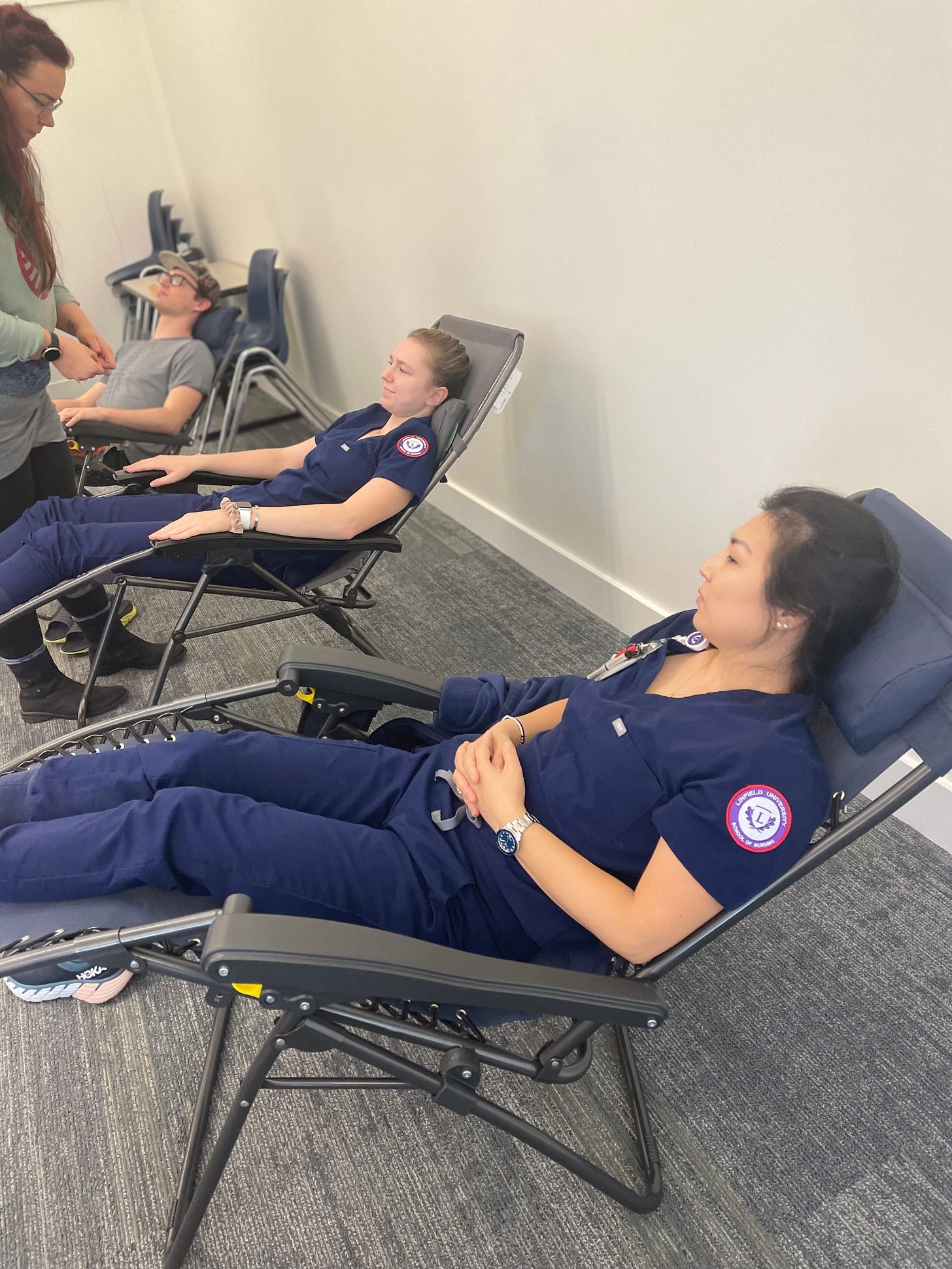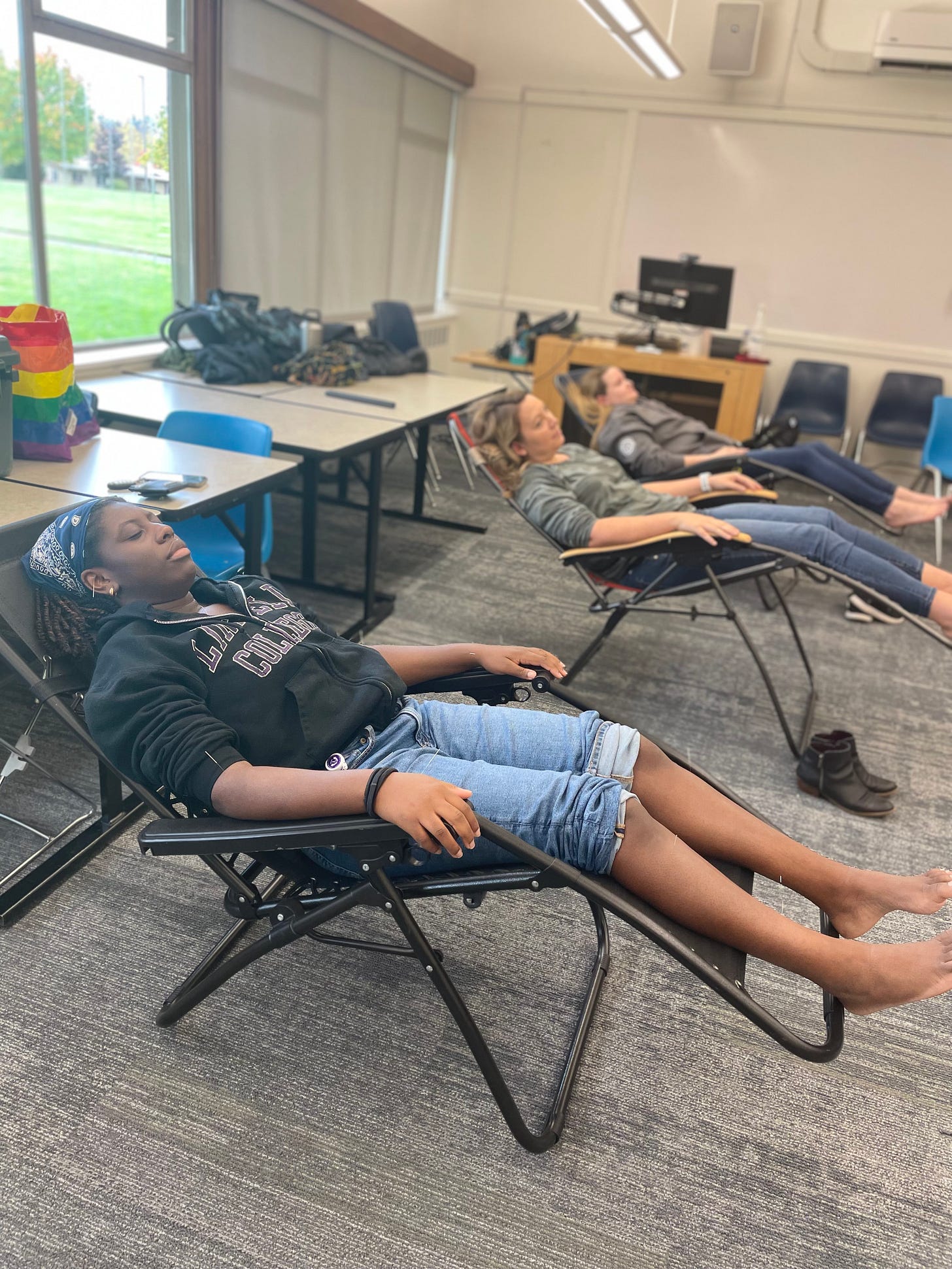WCA and POCA Tech have a partnership with Linfield University’s School of Nursing. I asked third-year POCA Tech student Jennifer Kehl for her thoughts about the impact of that relationship, and I’m delighted to share them with you here!
“Nurses are a unique kind. They have this insatiable need to care for others, which is both their greatest strength and fatal flaw.” —Jean Watson, American nurse theorist and nursing professor
As a nurse working in the ER, I was quite possibly the perfect community acupuncture patient. Stressed out. Depressed. Angry. Unable to relax. Possibly drinking too much. I had chronic low back pain. High blood pressure. Migraines. Insomnia. It turns out acupuncture is good for all of these, and western medicine doesn’t know how to treat any of them. Settling into a comfy recliner and just blurting out words “Frustrated” “Stressed” “Back Pain” was half the medicine. No one asked much of me. No one told me I needed to do anything except keep coming in. No mention was made of my less-than-stellar lifestyle habits. I just got to feel better.
Now that I’m in my 3rd year at POCA Tech and no longer working as a bedside nurse, I’ve had time to reflect on how in the world I got here. Being a nurse was/(is) my identity, like “human”, or “earthling”, but a few years ago, the idea of “not being a nurse anymore” started to settle in around me like a dense fog. Things were falling away from me and I felt strange. To try to suss out the damage a break from nursing would create, I made a list titled “What I Love About Nursing”.
Here is the complete and unedited version:
Helping strangers
Easing suffering
Laughing with people
Educating people
Bearing witness
Having comrades
Troubleshooting
Multi-tasking
De-escalation
Figuring things out for people
Making friends with children
Being part of a well-oiled machine
Being the lightning rod
It dawned on me that nothing on the list was specific to nursing. In fact, the community acupuncture clinic I had been floating in and out of for the last year was embodying most of it, but the script had been flipped. I was the stranger being helped. I was being taught how to relax. My mood had improved. I was less angry, less frustrated, and I was sleeping better. My back pain was gone, I rarely had migraines, and I was off my blood pressure pills.
The clinic was the lightning rod diverting all the terrible things to the ground. Silently, people were bearing witness. With just needles, cotton balls, and stillness, these things happened.
The leap from nursing to community acupuncture turned out to be more like a hop. Lost in the context of modern medicine, it’s easy to forget that nursing, at its core, is about community health. How to prevent illness. How to reduce suffering. How to care for those who can’t care for themselves. These things are becoming increasingly difficult to do within our current healthcare system. Value is not given to cheap and effective ways of helping people. Reducing suffering outside of pharmaceuticals is not the first line, or even the second or third line of treatment. Healthcare systems are not addressing the impact that short staffing has on the ability of the nurses to spend the time it takes to show compassion and really figure out what people need.
Unfortunately, these are not money making ventures for those holding all the cards.
It’s hard to ignore the lack of resources and access when you’re working in one of the biggest safety nets of all: the ER. And this safety net fails A LOT, whether it be for people with mental health issues, housing needs, substance abuse, or just plain lack of access to basic healthcare. It felt like failure every day. In a lot of ways, community acupuncture offers a safety net for the safety net. Countless patients (maybe all?) I’ve cared for over the years would benefit greatly from frequent doses of needles, cotton balls, and stillness. Just like I did.
Lisa Rohleder, in Acupuncture is Like Noodles talks about the possibilities.
“Acupuncture is not only valuable because it is an extremely inexpensive, non pharmaceutical therapy for pain and stress, but because it challenges the way we think about healthcare. Its profound simplicity is an antidote for the greed and bureaucracy that have created the American healthcare crisis. Community Acupuncture is, by its very nature, healthcare reform.”
For true and lasting healthcare reform, we are going to need partnerships. Looking at my list, “having comrades'' was a big one for me in the ER. We needed them all, from the internal comrades that heard me yell “I need help in here!” and came barreling in with the crash cart, to our external comrades, the medics, social workers, police officers, and my town’s beloved mobile crisis team. All these partnerships made up a tapestry that allowed the chaos and broken system to be somehow functional. The healthcare reform that community acupuncture offers is also going to rely on partnerships. When the mission is access and affordability for the most vulnerable populations, resources are bound to be slim. Creativity and passion are a must.
Partnerships will ensure community acupuncture’s sustainability and impact. They can also be fun.
In the sweetest full circle moment possible, the very first patient I treated as a POCA Tech intern was a nursing student at a pop-up clinic we did at Linfield University.

A previous cohort at POCA Tech set up this partnership as a way to introduce nursing students to acupuncture. It’s the hope that bridges can be built between our current healthcare system and community acupuncture. This will allow more people to have access to not only acupuncture, but the mission of WCA and POCA Tech to provide healthcare to those who would not otherwise have access to it.
I have to admit, as I sat down beside my patient, I had to restrain myself from grabbing him and yelling “RUN!!!! Get out of here as fast as you can!!!” Then I remembered, someone needs to take my place. The time had come for me to pass Florence Nightingale’s famous lamp on to the next generation of nurses. Armed with my needles, cotton balls, and stillness, it was my turn to take care of the caregiver.







